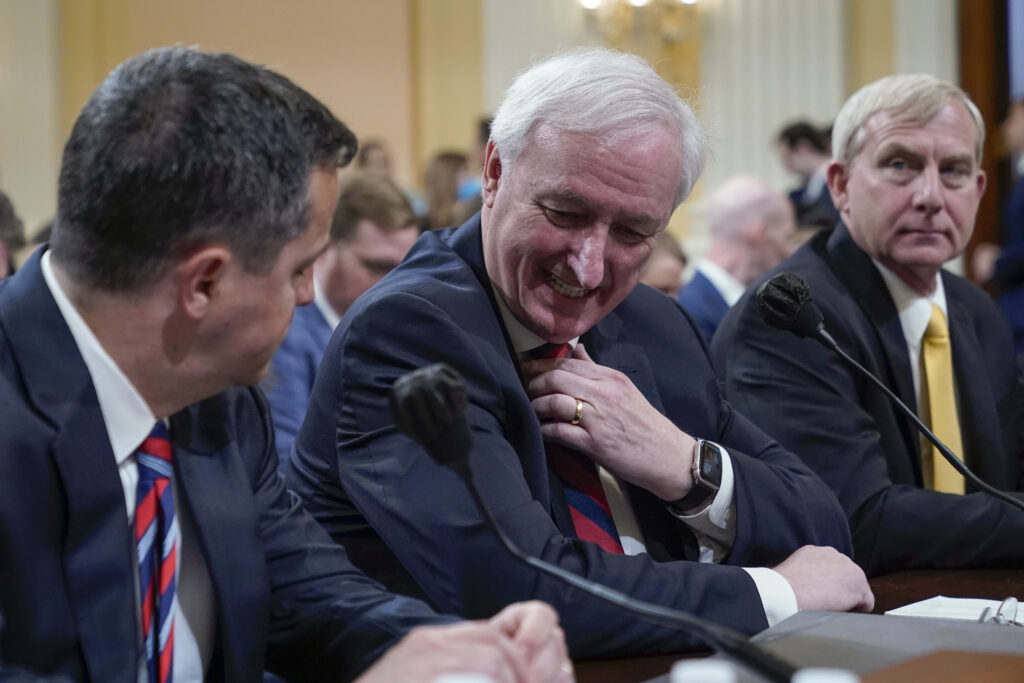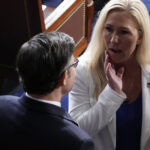
A disciplinary hearing this week for Donald Trump‘s ex-Department of Justice official Jeffrey Clark showcased the high bar prosecutors must reach in their effort to prove alleged crimes the former president and others are accused of committing in the buildup to the Jan. 6 Capitol riot.
Clark, 56, is fighting to avoid disbarment in Washington, D.C., as he faces Board on Professional Responsibility proceedings over allegations of dishonest conduct in the aftermath of the 2020 presidential election. The disbarment trial continued for a third day on Thursday with a witness called by Clark’s defense, Donald Elliot, a Yale legal expert who said punishing the former DOJ official would set a dangerous and “chilling” precedent.
Elliot, who also served as an assistant administrator and general counsel for the Environmental Protection Agency from 1989 to 1991, said Clark’s potential disbarment would have a “devastating effect on dialogue that goes on within government agencies,” a point that also highlighted the onerous fight special counsel Jack Smith faces to convict Trump for an alleged attempt to subvert the 2020 election results.

The unprecedented nature of the Jan. 6 riot and the events leading up to it have left prosecutors, courts, and bar associations with complicated questions about how to hold Trump and some of his associates accountable. Conduct that critics have described as an attack on democracy has not always fit neatly into existing categories of crime, a reality that has introduced an enormous amount of subjectivity into proceedings.
That subjectivity was elevated even further on Thursday when Clark’s attorney, Harry MacDougald, stated that “there was a period on Jan. 3, [2021] when [Clark] was acting attorney general until the president changed his mind later that day.” Trump only called off his plans after ranking White House and justice officials threatened a mass resignation at an Oval Office meeting that day, leading many of those former officials to testify later that they believed Clark was never promoted.
Unlike individual Jan. 6 riot defendants, some of whom have pleaded guilty for obviously illegal actions taken that day, Trump and close allies engaged in conduct after the 2020 election that may fall into a legal gray area, straddling somewhere between the expression of protected political opinions and the unlawful attempt to upend the Electoral College vote.
For Clark, who led the DOJ’s environmental division from 2018 to 2021, the gray area in which he operated is necessary for a functioning DOJ, according to Elliot.
“Because I think it’s important that we have the free and open exchange of ideas within agencies … I think about many ideas that are ultimately not accepted,” Elliot said Thursday.
“But I think that … one of the traditions in the United States is that even false ideas are protected when they contribute to the debate,” Elliot added.
The Yale expert’s testimony came after two days of testimony from witnesses brought by Washington, D.C., disciplinary counsel Hamilton Fox III, who relied on former Trump administration acting Attorney General Jeffrey Rosen on Wednesday to testify that Clark’s actions in the weeks following the 2020 election were outside the scope of his role at the DOJ. Rosen assumed his role on Dec. 24, 2020, days after former Attorney General Bill Barr resigned from his post.

Friction between Clark and his superiors Rosen, along with Rosen’s acting deputy Richard Donoghue, reached a new level during Jan. 2. and Jan. 3, 2021, meetings at the DOJ main facility and White House, Rosen said Wednesday.
Rosen, who was one of several ranking officials who threatened to resign if Clark was elevated to acting attorney general, said he told Clark on Jan. 2, 2021, that he was “really way outside his lane” by having contacts with Trump without top DOJ officials present, and for seeking access to a classified intelligence briefing related to foreign election interference issues. He also said he became disappointed when Clark admitted he would have accepted an offer from Trump, which Rosen contends never materialized, to take Rosen’s place as acting attorney general.
“This was not his role or responsibility at the department,” Rosen said of Clark, calling his contacts with the then-president “totally improper.”
Former federal prosecutor Neama Rahimi told the Washington Examiner that Rosen’s standpoint is valid in part because “there’s actually a written document that’s required before someone can be acting attorney general.”
“Everyone else who was threatening to resign at the time, none of them did resign. So that would lead everyone to believe and likely testify that the appointment never happened,” Rahimi said, adding that Clark’s lawyer “might be saying all sorts of things” because Clark has so far invoked his 5th Amendment right against self-incrimination 25 times in response to Fox’s interrogations.
However, one of Trump’s top attorneys in his federal and New York cases, Todd Blanche, instructed Clark to “maintain President Trump’s executive privilege and other related privileges, including law enforcement privilege, attorney client privilege, and deliberative process privilege,” according to a letter sent to the former senior DOJ official on Jan. 12.
Mike Davis, the former chief counsel for nominations to then-Senate Judiciary Chairman Chuck Grassley (R-IA), told the Washington Examiner that Rosen’s point of view about Clark’s role in the DOJ sets a “very dangerous” precedent.
“The fatal flaw in the bar prosecution against Jeff Clark is they don’t think he reported to the president of the United States, and he absolutely reported to the president … just like every other employee in the executive branch, especially a senior Senate-confirmed officer in the Justice Department,” Davis said.
Davis’s concerns were touched on during testimony on Tuesday by former White House counsel Patrick Philbin, who said there were many internal disagreements over what had been done and what should be done about alleged irregularities in the 2020 election results in Georgia. He also said he believed that Clark acted with sincerity, that Clark “felt essentially that he had a duty, where you think something wrong is happening … and he was the one who was sort of put on the spot and had to do something about it.”
Fox alleges Clark violated rules of professional conduct in part by drafting a letter to Gov. Brian Kemp (R-GA) and state legislative leaders, according to the draft letter dated Dec. 28, 2020, which claimed to have identified “significant concerns” that affected the outcome of the 2020 election in several states. While the letter was circulated to other officials in the DOJ, Clark ultimately did not send it after Donoghue, Rosen’s deputy, shot down his request to sign the document days after it was drafted.
Clark is an unindicted co-conspirator in the four-count federal indictment against Trump in Washington, D.C., which accuses the former president of plotting an attempt to overturn the results of the 2020 election. He was charged alongside Trump in August last year in the sweeping Fulton County, Georgia, racketeering indictment, which accuses him of violating the state’s racketeering laws and criminal attempts to make false statements in writings.
Trump stands accused in Washington, D.C., of a conspiracy to defraud the United States and a conspiracy to obstruct an official proceeding, as well as one count of obstruction and an attempt to obstruct an official proceeding and one count of conspiracy to “oppress, threaten and intimidate” people in their right to vote in an election, according to the federal indictment. Notably, none of the federal counts directly match the ones he faces in Georgia, which include several conspiracy counts such as “commit filing false documents,” and “commit false statements and writings,” to name a few. He has pleaded not guilty in all four of his criminal cases.
The different approaches by federal and Georgia prosecutors demonstrate the complexity of crafting concrete charges for conduct that skirted a legal line the courts have never had to draw before.
While proceedings are on hold in Trump’s Washington, D.C., case until the Supreme Court rules on a core presidential immunity question, the conversations in Clark’s disbarment hearing provided a narrow window into the types of questioning that could come up in an eventual trial against Trump, and the difficulty that prosecutors might face in proving their case.
For example, Clark’s attorney pressed Rosen during the hearing Wednesday on whether officials at the DOJ actually investigated the specific concerns Clark raised in the weeks after November 2020 about election integrity issues, such as a question about signature matching on ballots cast in Fulton County, Georgia.
After a member of the D.C. Bar overruled an objection to that line of inquiry from Fox, the disciplinary attorney leading the case for Clark’s debarment, Rosen acknowledged that he did not know whether the DOJ under his leadership investigated every allegation of election irregularity.
“I cannot tell you who specifically looked at which contention or allegation or if there is some contention that they didn’t look at,” said Rosen.

“So the answer is you don’t know?” MacDougald, Clark’s lawyer, asked.
“For the reasons expressed,” said Rosen, who also declined at one point during his testimony to answer whether he truly believed Clark or Trump’s concerns about purported election fraud were sincere.
Rosen’s testimony underscored the difficulty of proving that the Trump allies who raised concerns about election integrity, none of which have since been supported by evidence, did so in bad faith or in knowing violation of the law.
Clark’s hearing comes as former Trump campaign attorney John Eastman was recommended for disbarment on Wednesday by a California judge, prompting the lawyer and former law school dean to vow an appeal to a review court for the California State Bar.
But unlike Eastman’s disbarment proceedings, which began last June, Trump’s legal team did not intervene in those proceedings like they have for Clark, such as Blanche’s Jan. 12 letter advising Clark to exert “executive privilege.”
As part of that invocation, Clark sought but ultimately failed to block testimony this week from Philbin, Rosen, and former aide Ken Klukowski. Merril Hirsh, the D.C. Bar panel’s chairman, rejected such claims in a Feb. 28 decision, finding Blanche merely instructed Clark to uphold Trump’s privilege but did not purport to block other witnesses from testifying.
While Rosen and Philbin appeared at the hearing this week, Klukowski was notably absent from the proceedings despite being called by Fox to testify, and he did not respond to multiple requests from the Washington Examiner for comment.
CLICK HERE TO READ MORE FROM THE WASHINGTON EXAMINER
The panel’s decision could determine Clark’s chances to be selected for a high position in a potential second Trump administration. Hirsh said the proceedings could be concluded by next week.
Like Eastman, Clark will have the chance to appeal if the panel ultimately recommends him for disbarment.







